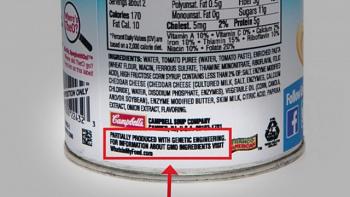USDA Claims to Support GMO Labeling, But Only Wants Companies to List a Phone Number or Scan Code, Not Actual Words
The U.S. Department of Agriculture
(USDA) is using a policy sleight of hand to appear as though it
supports listing genetically modified ingredients in foods, but without
actually requiring them to be spelled out.
As reported by Agriculture.com in recent days, the USDA Secretary Tom Vilsack has indeed officially called for making GMO labeling mandatory for food companies to place on their products. In a briefing to reporters at this year's Commodity Classic in New Orleans
– an annual event showcasing the newest innovations in agriculture –
Vilsack said that he is proposing mandatory labeling, because, in order
to ensure passage of legislation in Congress, 60 votes are necessary in
the U.S. Senate to prevent filibusters, which kill bills.
"That's
the key," Vilsack said. "If you don't get this requirement, then you
create a situation where every company could decide for itself to do
something, which could create confusion. Plus, you don't want state laws
that could potentially be at odds."
Giving the food industry time to figure out a way to be less transparent
Currently, several states are considering GMO labeling laws; Vermont has actually passed one.But Vilsack essentially left the door open for food companies – which he says need time to adapt to any new GMO labeling requirements – to find ways to meet the new mandate without actually providing quick, easily accessible information to consumers.
"You give the food industry some time to figure out how flexible the label needs to be, whether it's a toll-free number for consumers, a website, a smart label, or something else," he said. [Emphasis added.) "And then you use that time to educate people that this label is going to be available, and this is an opportunity for them to know about the food that they are buying."
But not really, if they don't have ready access to the technology required to actually find out about GMO ingredients in the foods they are considering buying.
That's the only way a majority of senators – many of whom are recipients of Big Food money – would consider any mandatory labeling bill (if there was a way to pretend to be requiring it without actually doing so).
"I think the House will give it great consideration and the president will sign it," Vilsack said.
Vilsack also says this national charade will co-opt stronger measures in the states, like Vermont, whose law actually requires food makers to list GMO ingredients on labels (this legislation is currently being litigated, by the way).
Then there is the TPP, which facilitates the proliferation of GMOs
There are also international trade implications, as noted by Agriculture:"Proponents of the Trans-Pacific Partnership (TPP) point out that it will make it easier for American entrepreneurs, farmers, and small business owners to sell Made-In-America products abroad by eliminating more than 18,000 taxes and other trade barriers on American products across the 11 other countries in the TPP."
Republican presidential contenders and Democratic contender Hillary Clinton have come out in opposition of TPP. Vilsack, who supports the measure like his boss, President Obama, was uncertain whether TPP would pass in the Senate before the next administration takes office.
"Through studies, we know that TPP will increase ag exports and increase ag incomes. Delaying the vote will cost the U.S. economy $94 billion, according to the Peterson Institute," he said. "We need to continue to point out that 95% of the world's consumers live outside of the U.S. So, we need to use agriculture as a benefit to moving this economy forward. So, we make the case and I think there will be adequate votes in the House and Senate to get TPP passed."
GMO labeling efforts continue in many states, and in every case they are being opposed by the very food industry such laws would hold to account. Meanwhile, the spread of GMO crops worldwide continues to grow, along with the glyphosate market.
Sources:
JustLabelIt.org
SBWire.com
Agriculture.com
Read More..
Comments
There are 0 comments on this post













